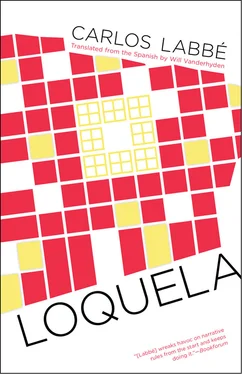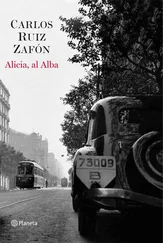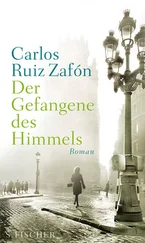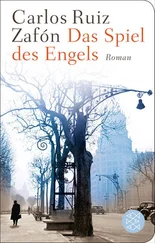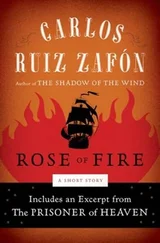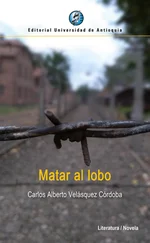I looked up from the book, I saw that the hands of He Who Is Writing the Novel were far away from me, clutching the chair. But how can you not understand that this is what’s most important? He shouted, furious, the guy decided to put his resolution in writing! The professor offered him money to keep something a secret and He Who Is Writing the Novel fumed that a time was coming when those who write would be able to defend that something. I don’t remember exactly what they were talking about, because I found myself somewhere else, on my balcony, looking out toward the port of Neutria, seeing myself in the light of a boat, in the night; I was leaving and Alicia was waving goodbye to me from a distance, her hand high in the air, leaning on the railing of the beachside boardwalk. I know that later He Who Is Writing the Novel was singing the praise of Corporalism and its founder, Our Young Poet, while I climbed up on the sofa to remove the painting from the wall and take it. The professor was so scandalized that he demanded we leave his house immediately.
Days later, He Who Is Writing the Novel buzzed the intercom at my apartment and asked for me. I heard Alicia’s laugh, she didn’t want to tell me who it was until he was already standing in my door, moving his hands up and down, nervous. I didn’t want him to come in my room, so I led him out to the balcony so Alicia could observe us calmly from the living room, while we turned our backs to her.
He Who Is Writing the Novel looked haggard. He took out a notebook and pen, sat down in one of the chairs, and told me he was about to fall down from sleepiness, because he could only write at night and in the morning he had to work and to study in the afternoon. He chose one of the chairs facing the sea. I already wrote this: I’m exhausted too, the words are leaving me behind, I can’t stop myself and the place where I come from, the place of the first lines of my letter — the simple story of my love for you in Neutria — is behind me; so I turn around — because it isn’t just movement that exists here, but the obligation to write “so I turn around”—and I delay in picking up the pen and again the words are behind me, like trying to touch something at the center of my own spine, unattainable yet mine alone. Alicia lost patience when I began to digress: better to get yourself two mirrors, put one behind you and one in front, open your eyes, my God. I got angry too: so why was she there, then. More than once, I’d held a hand mirror in front of me, turning my back on the big mirror in my grandmother’s bathroom, without success: behind me I always saw Alicia, never the nape of my own neck.
Carlos found a torn-out page from his novel on his desk. He was surprised to see it there, discarded, and when he read it he was baffled: it was a page from an old notepad, which he’d glued to the back cover of his notebook, where in two paragraphs the detective story made its first appearance and which one day he’d crumpled up and pitilessly tossed in the waste basket; the character left his house on a Sunday morning to buy the newspaper, still unsettled by the sleepless night he’d spent unable to produce a decent article for a crime-story magazine that had offered him a job. Not only would it be enjoyable to read the travel supplement and the reports about economic conspiracies, he could also find material in the police report, which offered detailed analyses of all kinds of crimes on that particular day. He crossed the street and paid the old man at the kiosk, turned around, and traveled half a block flipping through the headlines. On the corner he saw the figure of an albino girl, tall and thin, wearing a summer dress and carrying a notebook in one hand. He considered the paleness of her skin.
The red light gave way to green and the girl crossed the street; just then a car accelerated, not paying attention. She froze, the car didn’t even brake when she let out an ear-splitting scream, brushing against her and disappearing two blocks down. The albino girl fell to her knees, covering her face with her notebook. He asked her if she was okay, helping her up. When he stepped back a little, he saw that her tear-stained face was scrutinizing him. She murmured something incoherent, maybe a whimper, and then, as if he’d been the one trying to hurt her, took off running. He was left standing in the middle of the street, not knowing what to think. He found the albino girl’s notebook on the ground and picked it up. He walked home thinking about coincidence: just before the accident he’d actually wondered what it was that girl might be writing in those pages.
Carlos stopped reading. He recalled that earlier in the week he’d heard different people say that coincidences don’t exist. But what would happen if a third person forced someone to realize those unknown desires, he wondered, even if it was an accident. In that first version of the novel’s opening, the character had wanted to help the albino girl and yet he’d ended up delving into her pages; he thought about Elisa, about himself, and about the albino girl Violeta. He also reviewed the pages he was writing now: convinced that the killer would act that afternoon, the protagonist ended up shooting the girl, passing from investigator to investigated, from innocent to criminal with a single nervous movement of his hand. Someone’s eyes pulled him from his reflections. A man was watching him from the street, standing in front of his window; he didn’t bother to draw the curtain, instead he noted in the margin of the torn out page that the man’s face and eyes resembled his own. And when he looked up there was nobody there. Leaning on the window frame, he scanned the sidewalk for the man in vain: it must’ve been a neurotic, some passerby who wanted to examine the expression on the face that watched him obsessively from the window of some random house. When he was five years old, Carlos was convinced that every night a stranger watched him from the hallway while he slept; the paradox was that, if he stayed awake to prove there wasn’t anyone there, the terror kept him from lifting his head off the pillow and looking out into the hallway. Until he fell asleep.
September 21 st
4:15 A.M.
“Biblical statues tasting the salt in our own mouths, twisted and borne away by the wind in the movement of turning around, and yet, for a second joyful statues, nonetheless.” (A phrase shouted over and over in my dream, my own cries wake me and oblige me to write this down.)

September 24 th
(Every muscle in my body is tired. This is a final attempt to stay on this page. I could force myself to sleep, I could stare at the ceiling all afternoon, I could just let the phone ring [like right now], wondering who’s calling. I hope it’s Alicia, but know it’s not. She reappears a few days later when I’ve already slept off the intoxication of her and not even a trace of her mouth remains, talking to me between ironic laughs. I bet it’s some company calling to sell me something, or my mom reaching out to say hello, or some friend wanting to grab a beer. I want no more nights, no more sleepless nights, just radiant spring days lying in a plaza, the smell of freshly cut grass, Alicia’s quick, possessive eyes looking at me; her short eyelashes that make her seem like she never sleeps.)
The Little One asks me if I want to see her friends again. Of course she was emphatic; she was confirming that I was as fearful as she thought after the way I reacted on Saturday, when I left, running down the bar’s stairs, disgusted and bewildered, but not afraid: fear, that sensation that precedes sickness, disaster, disintegration, is a resource for those who need preparation for things. I’ve always been direct, right when I’m about to explode I open my eyes as if I’d slept from sunrise to sunset, and my own inability to prepare myself for the worst always surprises me. On Saturday, heading down the path that leads to the abandoned part of the hill, I found shreds of clothing, crumpled up papers, candles, kilos of hair, unused videotapes; The Little One had told me before about the Corporalists, that the boy had been expelled from the Universidad de Neutria after putting on that spectacle in the middle of the quad, the day that Violeta wanted to come (“to die” they told me) to Santiago. The story of a depraved professor, of a fake erotic manifesto written to take revenge against someone, I’m not going to spend my time talking about what happened or about their reason for fleeing to the one city they most hated, because there are things she won’t tell me yet. The curiosity led me to take the hand of The Little One, and I believed us to be in the middle of a field when suddenly we appeared on Américo Vespucio and the cars did what they could to avoid hitting the running drunks. I’m keeping the rest to myself, I’ll just add that when I woke up I was so sick I could barely lift my head; I bolted out the door of that dive bar, I couldn’t look at the stairs anymore, exhausted and puking, I went out into the street. Sunday morning, downtown, I don’t remember the street name (Puente, Catedral, Ahumada), all I heard were a few bored police officers harassing a beggar, sleeping on a bench; the cries reached my ears and I couldn’t comprehend why they were hitting him, nor could I distinguish between the cobblestones that passed before my eyes as I started to run. I couldn’t help recalling The Little One’s contortions on top of the table in the bar, the fat body of the man who cornered her against one wall; I understood that my decision in the spring to be someone else had come to an end at the point in the night when the Corporalists started to play word games and make bets; when the boy said delight , The Little One took off her last article of clothing. I woke up that Sunday afternoon in my own bed and allowed sleep to pull me away on other adventures where I wouldn’t stop to consider the implausibility of a phantasmagoric Victorian intrigue unfolding in my uncle’s country house, where an albino girl, fierce (sum of sums), and I were the only suspects in our own murder. I saw myself getting up the next day, slow and thirsty, I saw myself sitting in front of the notebook, the fucking notebook made everything stand still, the notebook where I watched myself lament not finding the precise expression to narrate the character’s disintegration.
Читать дальше
